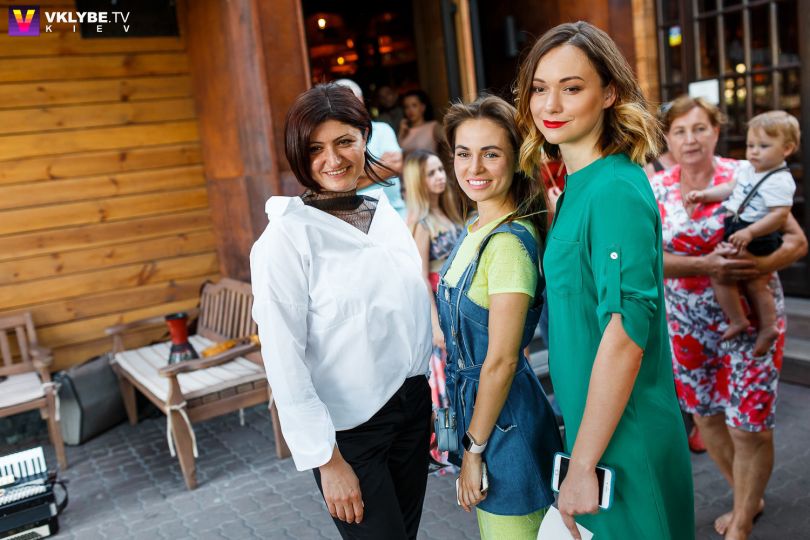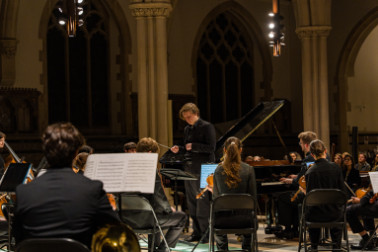Maria, how did the clientele change throughout the recent years? What do visitors seek? What are the main challenges that restaurateurs face nowadays?
I’ve been working in the restaurant business for 11 years. Indeed, much has changed. The competition is so high that there’s no point in staying in business if you don’t treat your guests with respect. You simply won’t be able to sell the product, and the restaurant demands great investments: equipment, repairs, personnel and the product in general. Nowadays you can find out about restaurants all over the world without leaving the house — TV, the Internet and social networks help a lot. For instance, you can follow many chefs on Instagram. It’s interesting that chefs abroad are very friendly and open: they post their works, film the process of cooking, share where they stock products etc.
When I worked at Arena City [an entertainment complex on Khreshchatyk] 11 years ago, there weren’t many restaurants in Kyiv. I mean, there were some coffee shops with weird coffee or very expensive restaurants. In 2007, my favorite salad cost UAH 65 in one of those — given that the Hryvnia - Dollar exchange rate was 5 to 1.
The 2008 crisis has sunken the medium-sized business but then gave it a chance to rise from the ashes. We understood that in general, our country isn’t wealthy and so are the people. That’s when the affordable restaurants started appearing. Nowadays many restaurants have contracts with farms that provide products for them — this enhances the quality and taste of the dishes. Besides, regular supplies really facilitate the work of the restaurant. However, it’s quite hard to open a new restaurant even nowadays. Apart from the financial side, you need a team and time for them to hit it off.  Now, let’s talk about the clientele. Clients in Ukraine are quite spoiled — but spoiled only in Ukraine. If they have bad customer service abroad, they usually keep it down. The bad reviews on TripAdvisor are mostly left by Russians. Yet when the local clients have any issues in Ukraine, they are quick to write a complaint on Facebook. Moreover, it’s very rare that the clients leave good reviews, but complaints are always there. We work in a sphere where the human factor plays a decisive role. Hostesses, waiters and chefs are all people, who have their own lives and problems.
Now, let’s talk about the clientele. Clients in Ukraine are quite spoiled — but spoiled only in Ukraine. If they have bad customer service abroad, they usually keep it down. The bad reviews on TripAdvisor are mostly left by Russians. Yet when the local clients have any issues in Ukraine, they are quick to write a complaint on Facebook. Moreover, it’s very rare that the clients leave good reviews, but complaints are always there. We work in a sphere where the human factor plays a decisive role. Hostesses, waiters and chefs are all people, who have their own lives and problems.
We train them to make the client always feel comfortable and welcome, but anything can happen. For instance, let’s take the opening of Chornomorka [a new seafood restaurant on Podil]. There were about 500 guests that came to the opening. Serving this number of people on the first day is a nightmare. Naturally, there are always shortcomings at the beginning — they are easier to eliminate gradually when the flow of guests only starts to grow.
But we had the so-called “train” situation when the customer flow is incredibly high. Everyone served the guests that night: waiters, director, hostesses and even the director of Chornomorka on Pozniaky. Don’t forget about cooks that work 12-hour shifts and waiters, who are on their feet serving dishes the whole day long. After the opening, we received two complaints and no positive reviews, whereas people left the restaurant with smiles on their faces. It’s a shame. This happens all over Ukraine — praise isn’t customary but people like complaining a lot.
Nowadays guests need more attention. They travel, explore the world and different cuisines, they evolve and if you don’t evolve with them, there’s a risk to be left behind and lose clients. I like that there are new restaurants with exotic tastes like Vietnamese, Korean or other Pan-Asian cuisines, multi-national restaurants like Greek-Semitic cuisine, or simply restaurants where you can order dishes from all over the world. Besides, it’s not how it was 10 years ago when you had sushi, pizza and hookah in one place. Nowadays it’s a mix of top tier and delicious dishes.
But you have to understand that it’s difficult to convey the same flavor that a person tried elsewhere. Once a year that person goes on a vacation, relaxes and goes to restaurants. Naturally, without stress and day-to-day problems, the perception of the flavor differs a lot. Although even in Ukraine, if guests are warmly welcomed in, say, Greek or Italian restaurant, are served delicious food in the right atmosphere, they will remember it and will come back. The main principle of our restaurants nowadays is that people should feel at home, or at least as if visiting someone they are very comfortable with.
What about alcohol? Do our clients know what’s what nowadays?
Yes, and it’s amazing. Before the most popular choice was whiskey and cola, but now it’s Negroni, sours and other classical but very sophisticated drinks. Just try to walk in the Alchemist bar on Friday — it’s packed. People also know more about wines and order this drink more often. We have about 18 sorts of wine in Matsoni restaurant. There’s a boom in Georgian cuisine restaurants and their respective wines grow more popular. The Greek wines are almost non-existent here, although they start to appear. Demand determines everything. Our clients really adore chacha.
What do you think about Kyiv fine dining scene?
 I really like Kyiv with its huge variety of choice. Sometimes it’s not so much about food, but about entertainment. In the past, people used to eat out on a special occasion; nowadays pastime you can enjoy on the way home from work or on a lunch break. That’s about Kyiv. Everyone can find a spot to his or her liking, tastes and budget. For instance, Market Plaza is a great alternative to Puzata Khata; it’s fast food of the new generation. They have beautiful tableware, delicious food and reasonable prices. You can also visit one of the expensive and posh restaurants on Mechnykova Street and try various dishes from all over the world.
I really like Kyiv with its huge variety of choice. Sometimes it’s not so much about food, but about entertainment. In the past, people used to eat out on a special occasion; nowadays pastime you can enjoy on the way home from work or on a lunch break. That’s about Kyiv. Everyone can find a spot to his or her liking, tastes and budget. For instance, Market Plaza is a great alternative to Puzata Khata; it’s fast food of the new generation. They have beautiful tableware, delicious food and reasonable prices. You can also visit one of the expensive and posh restaurants on Mechnykova Street and try various dishes from all over the world.
What’s your opinion on the concept promoted by Dima Borisov in Bilyi Nalyv and other similar restaurants, where you can wine and dine, and pay no more than UAH 100?
I think that’s really cool. If there are still queues waiting to get inside, it means that it’s in demand. I’m not sure about the benefit for the restaurateur but it’s certainly present in one way or another. Dima has smooth communication with people — he tells everyone that oysters cost UAH 29, even though in Chornomorka they cost UAH 24. People are satisfied with what he offers and the format — you stand in line and chat with your friends, eat oysters or a hot dog with cider, pay less than UAH 100 and go on with your business.
Have you ever had a desire to drop everything and work in another sphere?
Yes, there was a time. I worked for a year in PR agency. I’ve worked in the restaurant business since 19; but in the agency, I partnered with Logitech – producer of computer mice, speakers and other equipment. Then there were airlines and after — alcohol manufacturers. It’s actually easy to get a hang of it all. Yet it’s difficult to work in PR agency — you are no more than a cog in a machine. After all, I love the restaurant business, even if it’s a very complicated system.
Would you open your own restaurant, knowing the inside of the sphere and provided with enough finances?
Sure, I enjoy cooking.
What would it be like?
I always wanted something homey and cozy. I know European cuisine well, so I would promote it. The key thing is that the food would be delicious. No matter the interior or location even for a concept restaurant, if the food isn’t good, nothing will save it. The three pillars of the restaurant business are concept, team and cuisine. If you lack something, the mechanism won’t work like it should.
Is working with staff a part of your work responsibilities?
 May or may not, but I still do it anyway. If we have a special product week or a new menu, I write instructions for the personnel. We hold degustations for the waiters so that we not only tell them about the dishes but also get feedback. Now I’m backing from the external communications into internal — for instance, HR department and I write tips for waiters so that feel at ease with clients and vice versa.
May or may not, but I still do it anyway. If we have a special product week or a new menu, I write instructions for the personnel. We hold degustations for the waiters so that we not only tell them about the dishes but also get feedback. Now I’m backing from the external communications into internal — for instance, HR department and I write tips for waiters so that feel at ease with clients and vice versa.
As a mother, what do you think about kid-friendly restaurants in Kyiv?
Such restaurants pop up frequently nowadays. The reason behind is that the middle class — people aged 28-35 — now have kids. These people aren’t homebodies: they often go to concerts, festivals, restaurants and take their kids with them. That’s why kid-friendly restaurants appear so actively. Moreover, it’s not just a kid’s room and menu but the appropriately trained personnel that knows how to assist parents with kids, how to react on kids etc. I like where our gastronomic culture is going.
Translated by Kate Pryliuk.
Photos provided by Maria Shaposhnikova.









